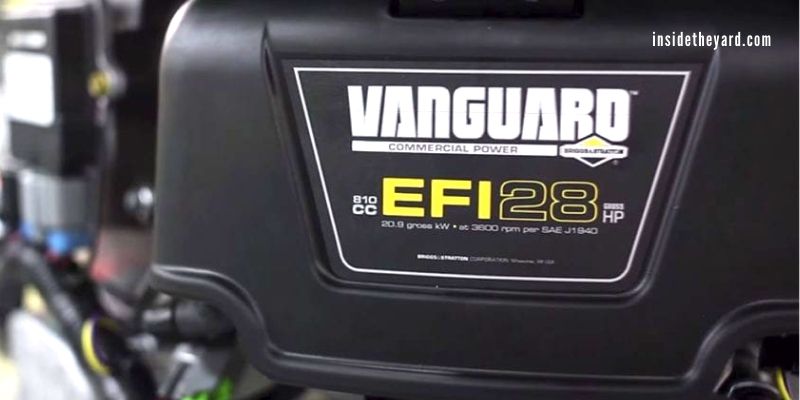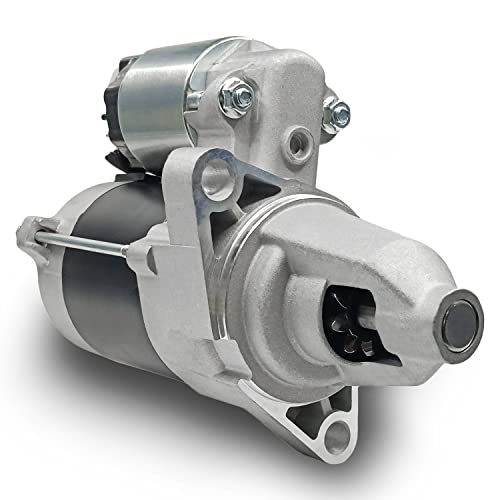
Mowing is fun. And a smoothly functioning lawnmower with EFI engines enhances the fun manifolds. If you have a lawnmower from Briggs & Stratton, you can attest to that. But vanguard EFI engine problems are also common and need to be dealt with efficiently.
The most common problems with vanguard EFI engines that you may face are the engine not turning on, difficulty in cranking the engine, emission of blue or white smokes, overheating, etc. Many users ask for professional help to solve those. But you can deal with these issues by yourself.
If you are interested in knowing a few remedies for the most common problems you face regularly, please stay with us.
Vanguard EFI Engine Problems
Each and every vanguard engine comes with the standard issue Briggs & Stratton engines troubleshooting guide. In most cases, following this guide will ensure a smooth performance from your lawnmower.
But, the truth is, that’s a rarity, and we wait until we see a problem. A passive, formal language and mechanical jargon also make understanding the user manual a difficult endeavor.
That’s why we summarize the most common problems seen on vanguard EFI engines. And we would also suggest remedies that you can apply to prevent the issues from happening.
Let’s start with the table below:
| Problems | Reasons |
| Difficulties in cranking | The sensor for the crank position not optimal, defective battery or batteries with no charge, problems in battery setting up – long battery lead or small diameter of the wire |
| Overheating | Dirt accumulation, blockade in airflow, inappropriate lubricant, leak in the fuel line, or obstacles in the flow of fuels |
| Smokes out of the engine | Not using an appropriate grade of fuel, overfilled crankcase, blown head gasket |
| Loud noise, subpar performance, fuel inefficiency, sudden loss of power | Using low-grade fuel |
The table above shows the 37 or 28 HP vanguard EFI problems you may face. We have also shown the probable reasons that are likely responsible for the problems happening in the first place.
Now let’s get to know the possible fixes that you can try on your own.
Cranking Difficulties
When you find the vanguard engine won’t start, there are a few things you can do before rushing to the local dealer or asking for professional help.
- Start with disconnecting the leads of the spark plugs.
- Then remove them and try to turn the crankshaft slowly with your hands. Check the battery leads and wire connections.
- Then check if the battery has enough juice to run.
- When you get these things sorted, the engine should start cranking. Before putting them back again, remember to clean the debris and dust out of the plugs.
Another reason the vanguard EFI engines do not crank is to wrongly position the cranking sensor.
- The optimal position for the cranking sensor is to set it up between the readings starting from 15000 and keeping it under 20000.
- You can go lower, but the sensor shouldn’t be under 12000. When the sensor is positioned around 12000, and the engine still won’t crank, then you should try the above remedies first. If the Vanguard seems not buzzing yet, call for professional help.
Overheating
Whether you operate a vanguard 37 EFI fuel pump or V-twin turbo, they all can overheat for several reasons. And if you leave them unchecked, some issues can start surfacing. Expanding parts of the metal, tear and wear enhancing with the possibility of seizing, etc.
All of those may cause expensive repairs which otherwise might have been avoided. As a bonus, dealing with overheating issues will also extend the life of engines.
Dirt Accumulation
Vanguard engines are air-cooled. Cylinder-head fins and blocks are used as transfer bays of heat from the engine. When you mow, grass, dirt, or debris accumulate over the fins, shedding heat gets reduced, and engines get overheated.
- To clean the fins, use a stiff brush to remove the buildup and then wipe it clean with a piece of clothing.
- Remember to carry out cleaning after every 100 hours of operation.
- Blockade in The Air Flow
An air-cooled motorcycle engine gets plenty of air from running at high speed to cool off. In contrast, your lawn mower moves slowly and doesn’t get enough air.
There are small fins on the flywheel, and they act more like a cage fan – air is drawn and pushed across the engine by them. And the cowling directs air away from the engine. That’s how your vanguard EFI cools off.
To prevent blockade appearing in the path of the airflow, do the following regularly:
- Cleaning the screen to clear debris and grass.
- Cleaning the fins
- Cleaning the cowling and keeping it intact.
- Inappropriate Lubricants
Engine oil or lubricants lubricate engines and also does the job of transferring heat. The heat generated in the combustion part is carried to the block. This helps the cooling mechanism to remove the heat from the chamber.
The lawn mower engines get heated easily for the low speed at which they move. Add summer heat to this factor – the overheating multiplies. In this situation, a lubricant with low viscosity burns off quickly. So, they can’t help the cooling-off process.
- To fight this, Briggs & Stratton recommends using a natural lubricant with high viscosity or a synthetic engine oil viscosity set at high temperatures.
- Irregular Flow of Fuels:
When or if a 37 HP vanguard EFI fuel pump fails to pump enough fuel, the temperature in the combustion chamber soars.
Two things can cause problems in supplying sufficient fuels for the engine – a pinhole leak somewhere along the fuel line creating difficulties in siphoning movements and bottlenecks in fuel flowing in the forms of clogged lines, needle jets or filters, etc.
Another issue is having spoiled seals on the carburetor. This paves the way for the engines’ thinning fuel mixture and stale fuel.
So, to deal with them, do the following:
- Check the fuel lines regularly and don’t leave any issues for fixing at a later date
- Use a fuel stabilizer.
Smokes Out Of The Engine
If the oil starts burning, there will be smoke, Low grade or inappropriate lubricants are the main reason for burning oil. Overfilled crankcase or faulty gasket also responsible for creating smokes.
- Start using appropriate lubricants
- Faulty gasket can’t be repaired, so replacing it would keep the smoke away.
- Repair or replace leaked crankcase, rings, and worn cylinders.
To get rid of loud noises, you should always be careful about using quality fuels. This will also increase fuel efficiency and ensure the continuous supply of power to the engines.
A Helpful Tutorial You May Need!
Frequently Asked Questions (FAQs)
Are vanguard engines any good?
Vanguard engines are very good. People have been using them since long. And that won’t happen if these engines couldn’t deliver the satisfaction people look for from them.
Who makes the vanguard engine?
Briggs u0026amp; Stratton Corporation makes vanguard engines. This outfit was established about 113 years ago, and since then, they keep delivering quality engines.
Is Briggs u0026amp; Stratton the same as Vanguard?
Briggs u0026amp; Stratton is the name of the company that makes vanguard engines. So, is a way, they mean the same things
Final Words
As we have mentioned, the fun factor in mowing can be eliminated if we leave the vanguard EFI engine problems untreated.
We can sort out the issues discussed above if we are a little bit careful in maintaining the machines. But truth to be told, many of those problems can cause us trouble even if we are careful in regular maintenance.
Grass, debris, summer heating, degrading qualities of fuel, etc., are the things that we can’t get away with. So, it’s always handy to have the skills to complete the basic necessities.
That will save our time and sometimes a hefty sum of money – which we may have to pay to get the best performance out of our vanguard EFI engines.
You Can Also Read:
- Solve Scag Cheetah Problems And Get A Great Mowing Journey!
- Things You Should Know About Scag Turf Tiger Common Problems
- How to Free Wheel Scag Cheetah- Know the Crucial Point Just!
Was it helpful?

Enamored with the world of golf Jack pursued a degree in Golf Course Management at THE Ohio State University. This career path allowed him to work on some of the highest profile golf courses in the country! Due to the pandemic, Jack began Inside The Yard as a side hustle that quickly became his main hustle. Since starting the company, Jack has relocated to a homestead in Central Arkansas where he and his wife raise cattle and two little girls.






